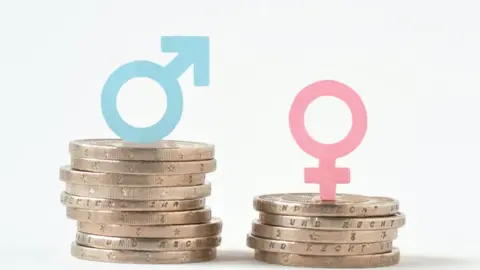Should workers be asked what they earn?
 Getty Images
Getty ImagesThe practice of many firms of asking job applicants what they currently earn is partly to blame for trapping women on low pay, a charity has said.
The "salary question" means women underpaid in their current job are more likely to be underpaid in the next one, the Young Women's Trust charity said.
It said including salary details in job adverts instead would help close the gender pay gap between men and women.
The CBI warned the move could have "unintended consequences".
A spokesperson for the employers' organisation said: "Closing the gender pay gap is complex. Publishing pay bands on job adverts is good practice, but banning conversations about pay isn't the best solution and could have unintended consequences."
The CBI said issues such as the availability of affordable childcare and careers advice were also important factors in closing the gender pay gap.
Asking applicants about previous or current pay has already been banned in New York and California.
The Young Women's Trust, a charity that supports young women on low or no pay, says that, other than in exceptional circumstances, UK organisations should follow suit.
 Getty Images
Getty ImagesThe government this year introduced a requirement that UK companies with 250 or more employees must publish their gender pay gap data.
The gender pay gap is the percentage difference between average hourly earnings for men and women.
Across the UK, men earned 18.4% more than women in April 2017, according to the Office for National Statistics (ONS).
Transparency
The Young Women's Trust commissioned a YouGov poll which found that nearly half of advertised jobs did not include any wage details with the practice most common in the private sector.
The charity says that making pay more transparent would make it harder for employers to, even unintentionally, pay men and women different amounts for similar roles.
The Women's Trust says many employers agree that organisations should publish salary details for all roles to increase transparency, with some saying it is best practice as it encourages more applicants.
In the charity's survey 48% of employers were in favour of the measure to bring about gender equality in the workplace.
Its chief executive, Carole Easton, said: "We have to break the cycle that traps women in low pay. Women often start work on a lower salary than men, move to a new job and are paid based on their previous wage, as opposed to what they or the role are worth - so they continue to be paid less."
She said that their research showed women were more likely to disregard jobs if they felt their skills didn't match up to them, whereas men would often apply anyway.
Including salary details in job adverts would help women to see that jobs are in fact at their level and give them an idea of where they should be negotiating from to progress their pay, Ms Easton added.
The charity's analysis of Office for National Statistics data found that women lose out on nearly £140bn a year in total due to the full-time gender pay gap.
Well over three-quarters of UK firms pay their male staff more than their female workers.
